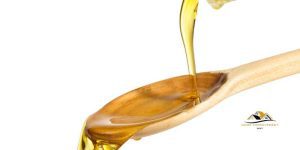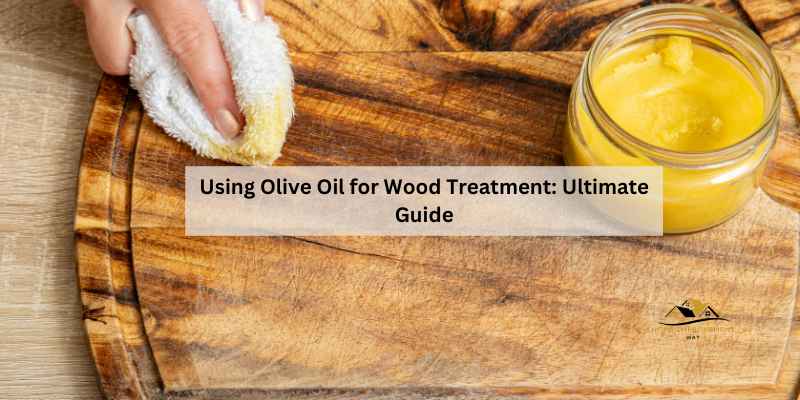Using olive oil for wood treatment can provide some protection and conditioning to the wood, but it may not be as effective as other wood oils due to the risk of it going rancid over time. While it won’t create a solid paste like beeswax, a combination of olive oil and coconut oil can still offer some benefits to the wood.
However, it’s essential to note that olive oil may not be the best option for long-term wood protection due to potential rancidity and bacterial growth. When used in moderation, it can help bring out the natural beauty of wooden fixtures.
If you are considering using olive oil for wood treatment, it’s crucial to weigh its benefits against potential drawbacks and consider alternative wood oils for long-term protection.
Benefits Of Using Olive Oil On Wood
When it comes to wood treatment, olive oil has been a popular choice due to its numerous benefits. Not only does it provide a natural and safe option for wood treatment, but it also offers several advantages that make it an ideal choice for preserving and enhancing wooden surfaces. Let’s explore the benefits of using olive oil on wood.
Makes Moisturizes And Lubricates
Olive oil serves as an excellent moisturizer and lubricant for wood. It penetrates the wood, helping to prevent it from drying out and becoming brittle. This moisturizing effect helps to maintain the wood’s flexibility and structural integrity, reducing the likelihood of cracks and splits.
Brings Out Natural Beauty
Using olive oil on wood can bring out its natural beauty, enhancing the grain and overall appearance of the wood. It adds a rich, lustrous finish, highlighting the unique characteristics of the wood. This natural enhancement can give wooden surfaces a timeless and elegant look.
Safe And Natural
One of the key advantages of using olive oil for wood treatment is that it is a safe and natural option. Unlike some commercial wood treatments that may contain harmful chemicals, olive oil provides a non-toxic alternative. It is also readily available and environmentally friendly, making it a sustainable choice for wood treatment.
Comparing Olive Oil To Other Wood Oils
When it comes to wood treatment, olive oil is a popular natural option. Let’s explore how it compares to other wood oils:
Danish Oil
Danish oil is a popular choice for wood finishing due to its blend of varnish and oil, providing a durable finish.
Linseed Oil
Linseed oil, derived from flaxseeds, penetrates deep into wood to enhance its natural beauty and provide protection.
Vegetable Oil
Vegetable oil can be used as a budget-friendly alternative for wood treatment, offering some level of protection.
How To Use Olive Oil On Wood
Olive oil can be used to treat wooden surfaces, such as chairs, tables, and worktops. Simply apply a small amount of olive oil onto a clean cloth and rub it into the wood in the direction of the grain. This will help to moisturize and protect the wood, enhancing its natural beauty without leaving a wet surface.
Preparing The Wood Surface
Before applying olive oil on wood, ensure the wood surface is clean and dry to maximize absorption.
Applying The Olive Oil
- Apply a small amount of olive oil onto a clean cloth or sponge.
- Rub the olive oil onto the wood surface in circular motions.
- Allow the oil to penetrate the wood for a few hours or overnight.
Buffing And Polishing
- Buff the wood surface with a clean cloth to remove any excess oil.
- Polish the wood with a separate cloth to enhance the shine
Precautions When Using Olive Oil On Wood
When using olive oil for wood treatment, it is important to be aware of certain precautions to ensure the best results. Here are some key considerations to keep in mind:
Avoid Using Virgin Olive Oil
It is advisable to avoid using virgin olive oil for wood treatment, as it does not work as effectively as other types of olive oil. Instead, opt for regular olive oil or a combination of olive oil and coconut oil for better results.
Risk Of Rancidity
Olive oil has the potential to become rancid over time when used on wood. This can lead to an unpleasant odor and an unsightly appearance on the wood surface. It’s important to monitor the wood regularly to avoid this issue.
Not Suitable For Unfinished Wood
Olive oil is not suitable for use on unfinished wood. It is best used on finished wood surfaces to enhance their natural beauty and provide moisturization and protection.
FAQs About Using Olive Oil On Wood
Enhance wood with olive oil, a natural way to nourish and protect wooden surfaces. Olive oil aids in maintaining wood’s luster and durability, revealing its natural beauty. It’s a simple and effective method for wood treatment.
Are you looking for a natural and effective way to treat your wooden furniture? Olive oil might be the solution you need. This versatile oil can be used to enhance the natural beauty of your wooden furniture, protect it from wear and tear, and even extend its lifespan. However, before you start applying olive oil to every wooden surface in your house, you might have a few questions. In this article, we will answer some of the most common FAQs about using olive oil on wood.
Can Olive Oil be Used on Cutting Boards?
Yes, olive oil can be used on cutting boards, but only in moderation. Cutting boards require regular maintenance to keep them clean and sanitary. Olive oil can help condition the wood and prevent it from drying out, but too much oil can cause the board to become sticky and attract bacteria. To treat your cutting board with olive oil, clean it thoroughly, apply a small amount of oil, and let it soak for a few hours before wiping off any excess.
Can Olive Oil be Used on Butcher Block Countertops?
Yes, olive oil can be used on butcher block countertops, but it is not the best choice for long-term maintenance. Butcher block countertops require regular oiling to prevent them from drying out and cracking. While olive oil can be used as a temporary solution, it is not as effective as other oils specifically designed for wood treatment, such as mineral oil or beeswax. These oils penetrate the wood and provide long-lasting protection against moisture and wear.
Can Olive Oil be Used on Outdoor Wood Furniture?
Yes, olive oil can be used on outdoor wood furniture, but it is not recommended for long-term maintenance. Outdoor wood furniture requires protection against the elements, including moisture, UV rays, and pests. While olive oil can help condition the wood and enhance its natural color, it is not a durable or long-lasting solution. Instead, consider using a specialized outdoor wood sealer or oil that is specifically designed to withstand the harsh outdoor environment.
In conclusion, olive oil can be a great natural option for treating your wooden furniture, but it is not always the best choice for every situation. By following these simple guidelines and using the right oils for your specific needs, you can keep your wooden furniture looking beautiful and protected for years to come.

Frequently Asked Questions
Can I Use Olive Oil Instead Of Linseed Oil On Wood?
You can use olive oil instead of linseed oil on wood, but avoid virgin olive oil as it may not work as effectively. Mix two parts olive oil with one part lemon juice for a furniture polish on finished wood.
Will Olive Oil Go Rancid On Woodworking?
Yes, olive oil will go rancid over time when used on woodworking. It is not recommended for wood treatment.
Can I Treat Wood With Olive Oil?
Yes, you can treat wood with olive oil, but avoid using virgin olive oil as it doesn’t work well. Olive oil is a good moisturizer and can bring out the natural beauty of wood. However, it may go rancid over time.
Is Olive Oil Any Good For Wood?
Olive oil is good for wood as a moisturizer and lubricant, enhancing natural beauty and preventing wear and brittleness.
Conclusion
Incorporating olive oil for wood treatment provides natural nourishment and enhances the wood’s durability. This cost-effective method can revitalize various wooden surfaces like furniture, worktops, and storage boxes. Remember to avoid using virgin olive oil and opt for a combination with coconut oil for better protection.
Embrace the benefits of olive oil for maintaining your wooden fixtures.


